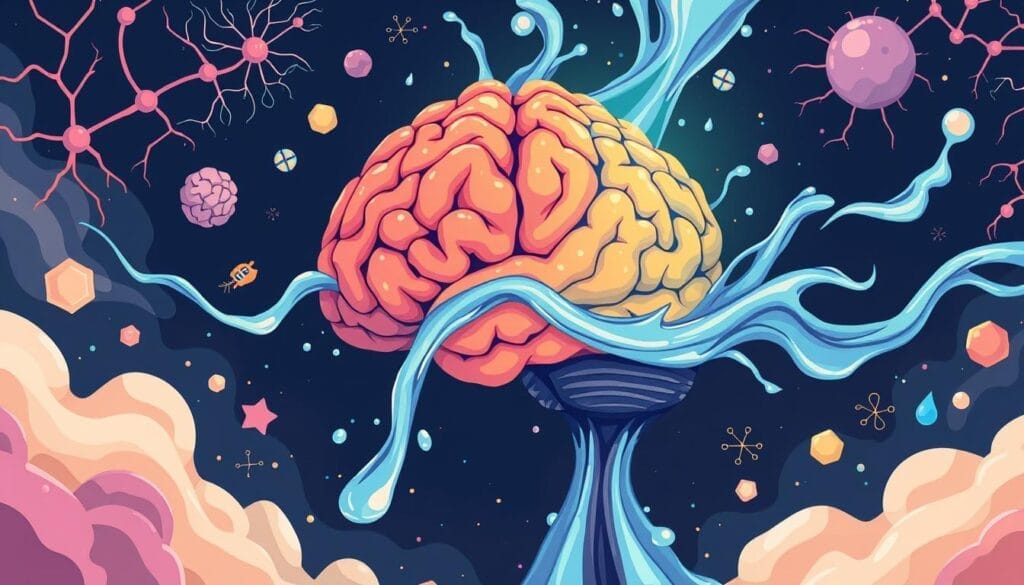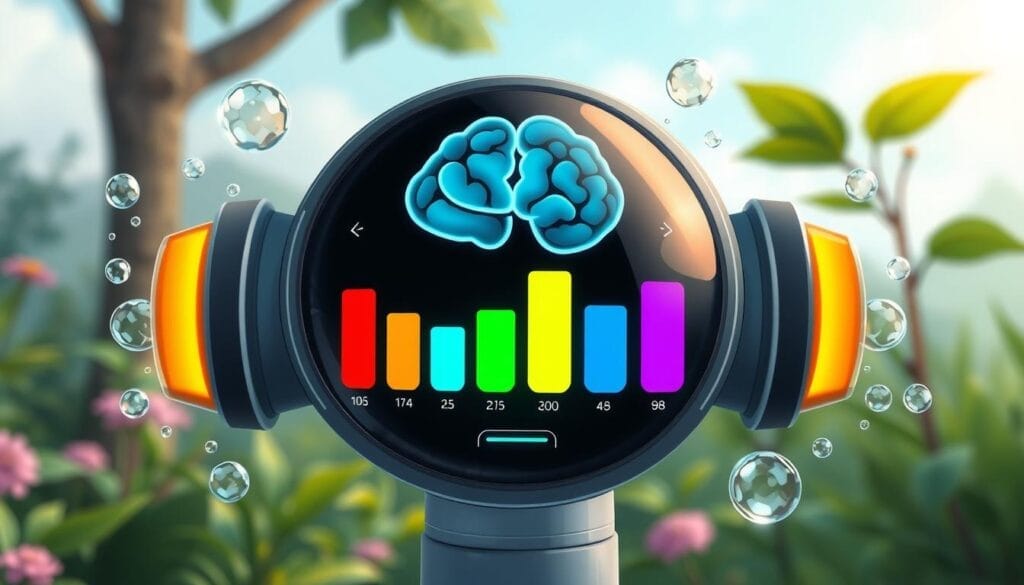What if the cause of your brain fog isn’t stress or overwork but something as simple as not drinking enough water?
Most people don’t realize this, but your brain is incredibly sensitive to hydration levels. That glass of water you skipped might be the reason you’re forgetting names, headache, feeling anxious, or unable to focus.
The impact of hydration on neurological health is deeper than just keeping your brain refreshed. Even a little dehydration can affect your mood and thinking. Water plays a direct role in how our neurons communicate, how we think, how we feel, and even how we age. Neglecting hydration doesn’t just make you tired, it may silently speed up cognitive decline.
In this blog, we will break down the science behind hydration and brain health. We’ll explore how even mild dehydration can mess with memory, mood, and mental performance and how staying hydrated could help protect your brain from serious conditions like Alzheimer’s and migraines.
Table of Contents
ToggleUnderstanding Hydration and Its Importance
Drinking enough water is key for keeping our bodies balanced. It helps our body work right. We need to drink the right amount of water to stay healthy.
Definition of Hydration
Hydration means keeping the right amount of water in our bodies. It’s about drinking enough water and eating foods with water. We lose water through sweat, pee, and breathing.
Recommended Daily Water Intake
How much water we should drink changes with age, sex, and how active we are. The Food and Nutrition Board set guidelines for water intake in 2004. For adults, drinking about 8 cups (2 liters) a day is a good rule.
Signs of Dehydration
Even a little dehydration can hurt how we feel and think. Signs include:
- Thirst
- Dry mouth
- Fatigue
- Dizziness
- Headaches
- Dark yellow urine
- Muscle cramps
More than 2% body weight loss from dehydration makes us tired and less focused. This shows why keeping our fluid balance is so important.
The Brain and Water: Why Your Brain Runs on Water?
The human brain is amazing, made up of about 75% water. This shows how important brain hydration is for thinking and brain health. Water helps keep nerves working well by protecting them with a special layer.
Composition of the Brain
The brain’s makeup and shape depend on how hydrated it is. Not drinking enough water can shrink the brain. Studies show a 0.55% decrease in brain volume after just 16 hours of water restriction.
But drinking water again can make the brain bigger. It can grow by 0.72% compared to baseline.
Role of Water in Cognitive Function
- Drinking enough water is key for good memory, focus, and concentration.
- Not drinking enough water can hurt how well we think. It can cause ventricular expansion and a 1.63% decrease in brain tissue fluid after just 12 hours without water.
- It’s very important for kids’ brain growth and for keeping older adults’ brains sharp. As we get older, we might not feel as thirsty.
Knowing how the brain and water are connected helps us understand the impact of hydration on neurological health.
How Dehydration Affects Brain Function
Even a 1–3% drop in hydration can mess with how you think.
- Brain fog and slowed thinking become noticeable even before you feel thirsty.
- Headaches often come from the brain pulling away from the skull due to fluid loss.
- Memory and focus suffer because nerve signals slow down.
Study: According to the Journal of the American College of Nutrition (2013), just 1–2% dehydration causes measurable cognitive decline in adults.
Effects of Dehydration on Cognitive Performance
What if your ability to focus at work or school had more to do with water than willpower? Let’s look at what the data says.
Memory, Focus & Decision-Making
Hydration improves how quickly your brain reacts and processes decisions.
- A 2021 systematic review in Nutrients shows a strong link between hydration and executive brain function.
- Brain scans show more activity in the prefrontal cortex when subjects are properly hydrated.
- Decision-making speed improves by up to 14% with adequate water intake.
Mood and Mental Health Connection
Water isn’t just physical, it’s emotional too.
- Dehydration can make you irritable, anxious, and even mimic symptoms of depression.
- The European Journal of Clinical Nutrition found mild dehydration (1.5%) negatively affects mood in both adults and teens.
- Mood swings and low energy often disappear within 20 minutes of drinking water.
The impact of hydration on neurological health includes emotional stability, you might just be thirsty, not moody.
Short-term Consequences
When we don’t drink enough water, our brain’s skills can go down. This includes memory, how well we can work with information, and how we see and move things. Losing just 2% of our body weight from not drinking enough can make these problems worse.
People who don’t drink enough might find it hard to remember things, do math, and stay focused. They might also feel really tired and have trouble concentrating.
Long-term Implications
Dehydration over a long time can really harm our brain. It can make brain cells smaller and weaker. This is something that happens to many older people.
This can weaken the protection around our nerves. Over time, this can cause nerve damage. If we don’t drink enough water, the impact of hydration on neurological health can even lead to serious problems like delirium, coma, and death.
It’s very important to drink enough water to keep our brain working well. Drinking water can help fix the problems dehydration causes. So, it’s key to drink water all day long.

The Link Between Hydration and Memory
Drinking enough water is key for keeping your memory sharp. Research shows that even a little dehydration can hurt your memory and brain work. Drinking water and eating foods that help keep you hydrated can boost your memory and brain function.
Impact on Memory Retention
Dehydration can really affect how well you remember things. A study found that dehydrated adults worked their brains harder when doing tasks that need thinking. Another study showed that older women who didn’t drink enough water did worse on tasks that need focus and quick thinking.
Hydration Strategies for Better Recall
To keep your memory and brain working well, drink plenty of water. Here are some tips:
- Drink water all day, aiming for 11.5 cups for women and 15.5 cups for men.
- Eat foods that are full of water, like watermelon, cucumbers, and leafy greens.
- Stay away from drinks with sugar or caffeine, as they can make you lose water.
- Check your urine color to see if you’re drinking enough water – it should be light yellow to clear.
By focusing on drinking enough water, you help your brain remember things better. This improves your brain’s health and how well you think.
Dehydration & Neurological Disorders
What if managing your neurological condition better started with better hydration? It sounds simple, but studies show water plays a big role.
Migraines and Chronic Headaches
Migraines and chronic tension headaches often start with fluid loss.
- When dehydrated, blood vessels in the brain expand, triggering pain.
- Loss of electrolytes affects nerve sensitivity.
- 1 in 3 migraine sufferers reports dehydration as a common trigger.
Hydration for migraines is a clinically proven strategy for reducing headache frequency.
Alzheimer’s Disease & Cognitive Decline
The glymphatic system is your brain’s clean-up crew. It depends on water.
- Water helps flush out amyloid plaques through the glymphatic system.
- Mild dehydration slows this clearance, allowing harmful buildup.
- Harvard Health (2020) reports early dehydration speeds up cognitive decline in high-risk groups.
Glymphatic system hydration may delay or reduce signs of dementia and Alzheimer‘s.
Multiple Sclerosis and Parkinson’s
In conditions like MS and Parkinson’s, symptoms worsen with poor hydration.
- Neurological fatigue increases when water levels drop.
- Poor fluid balance worsens cognitive dysfunction.
- Medications often lead to fluid loss as a side effect.
The impact of hydration on neurological health is vital when managing water intake helps patients better cope with brain disorders.
Drinking enough water is key for brain health. It helps with conditions like Alzheimer’s and Parkinson’s. Drinking water can keep the brain healthy and slow down cognitive decline.

By focusing on hydration, we can support our brain health. It’s part of a good healthcare plan. It helps reduce risks from neurodegenerative diseases.
Hydration in Different Age Groups
Keeping the right amount of water is key for brain health. But, each age group has its own needs. It’s important to know how much water kids and older adults should drink.
Hydration Needs in Children
Children need enough water for growing and learning. Not drinking enough can hurt their brain and make it hard to focus. It can even slow down their growth.
How much water kids need depends on their age, how active they are, and where they live. It’s good to have them drink water all day. Also, give them water-rich foods like fruits and veggies.
Hydration for the Elderly
Older people are more likely to get dehydrated. This is because they might not feel thirsty as much. Their kidneys also change with age, and some health issues can make it harder to stay hydrated.
Research shows that many older adults don’t drink enough water. This can lead to serious problems like brain decline and even death. It’s very important for older adults to drink enough water to stay healthy.
It’s vital to make sure each age group gets the right amount of water. This helps keep their brains healthy from childhood to old age.
Signs You’re Not Drinking Enough for Brain Health
Sometimes we mistake the early signs of dehydration for anxiety or stress. But the brain knows.
Early Symptoms of Dehydration Often Mistaken as “Stress”
If you’re feeling off, these may be dehydration signs:
- Poor focus
- Low energy
- Lightheadedness
- Irritability or sadness
These symptoms mirror early signs of mental fatigue dehydration.
Brain Hydration Checklist
Use this quick checklist to track if your brain is hydrated:
| Symptom | Possible Link to Dehydration |
|---|---|
| Headaches | Likely |
| Trouble focusing | Very Likely |
| Forgetting things | Common |
| Feeling low or anxious | Possible |
| Dry mouth or lips | Definite |
| No thirst, but tired | Hidden dehydration |
Signs of dehydration in the elderly brain or even young adults are easy to miss—check often.
How Much Water Does Your Brain Need? Science-Based Guidelines
The answer depends on age, gender, and activity. But most people don’t drink enough.
Age, Gender & Activity-Based Needs
| Group | Daily Water Intake (Liters) |
| Adult Men | 3.7 L (13 cups) |
| Adult Women | 2.7 L (9 cups) |
| Children (9-13 yrs) | 2.1-2.4 L |
| Elderly Adults | 2.5 L (due to slower thirst) |
How Neurological Patients Should Adjust Fluid Intake
Neurological patients must adjust water intake carefully.
- Medications can cause water loss (e.g., diuretics).
- Mobility issues reduce fluid access.
- Swallowing difficulties may require infusions or thickened fluids.
One line takeaway: Hydration is part of a neuroprotective lifestyle, especially for seniors and chronically ill patients.
Best Practices for Staying Hydrated
Drinking enough water is key for good health, including brain function. Doctors say we should drink at least eight 8-ounce glasses of water a day. This helps our brains work well and keeps our mood stable. But, how much water we need can change based on our age, how active we are, and where we live.
Tips for Daily Hydration
- Carry a reusable water bottle and sip on it all day.
- Set reminders to drink water, especially when you’re active or it’s hot outside.
- Drink less of things like alcohol and coffee, as they can dry you out.
- Eat foods with lots of water, like watermelon, cucumbers, and oranges, to stay hydrated.
Foods High in Water Content
- Watermelon (92% water content)
- Cucumbers (96% water content)
- Oranges (87% water content)
- Tomatoes (94% water content)
- Broccoli (91% water content)
Eating these foods can help you drink enough water each day. They support your brain’s health. Remember, staying hydrated is vital for your brain’s well-being.
Morning to Night: Creating a Hydration Routine
- 6:30 am: 1 glass of room-temp water (restarts brain function)
- 10 am: Herbal tea or fruit-infused water
- 1 pm: 1 full glass before lunch
- 3 pm: Coconut water or electrolyte water
- 6 pm: Small cup with light snack
- 9 pm: Small sip if not on fluid restriction
Tips for seniors:
- Use alarms or hydration apps.
- Keep water within reach at all times.
Building a routine supports long-term hydration brain performance.

The Role of Electrolytes in Hydration
Electrolytes, like sodium and potassium, are key for staying hydrated and keeping our nerves working right. They help our nerves send signals by carrying electrical charges.
Importance of Sodium and Potassium
Sodium and potassium help keep the right amount of fluid in our bodies. Sodium keeps fluid inside and outside cells. Potassium is important for muscle work, like the heart.
Balancing Electrolytes for Neurological Health
- Having the right electrolyte balance is key for good neural performance. If electrolytes are off, we might feel confused, weak, or even have seizures.
- Keeping electrolytes balanced helps our nerves talk to each other smoothly. This is how our brain and body communicate.
- When we’re dehydrated, our electrolytes can get out of whack. This can hurt our nerves. Drinking enough water and eating right is important for our brain health.
Knowing how important electrolytes are helps us stay healthy. We can keep our electrolyte balance right by drinking enough water and eating well. This supports our neural performance.
Supplements & Hydration Synergy
Some vitamins only work when your body is hydrated.
- Magnesium: Helps regulate nerve signals; needs water to absorb.
- B Vitamins: Support brain energy; water-soluble.
- Omega-3s: Reduce neuroinflammation and water intake helps them reach brain tissues.
One line takeaway: Stay hydrated so your brain supplements don’t go to waste.
Debunking Common Hydration Myths About the Brain
Let’s break down some common myths about brain hydration in a simple table format.
| Myth | Truth |
| Only athletes need to worry about dehydration | False. Everyone needs hydration for brain function, even desk workers and students. |
| Thirst is the only signal your body gives | False. The brain misreads thirst—especially in older adults. You can be dehydrated without feeling thirsty. |
| Coffee and tea dehydrate you | Outdated. Caffeine is mildly diuretic, but these drinks still contribute to hydration. |
| Clear urine always means you’re hydrated | Misleading. Clear urine can result from overhydration or poor kidney function. |
| Drinking lots of water at once rehydrates quickly | Risky. Overloading water too fast can cause electrolyte imbalance, sip throughout the day instead. |
| If you’re not sweating, you’re not losing fluids | False. You lose fluids through breathing, digestion, and dry environments too. |
Hydration isn’t about waiting until you’re thirsty, it’s about keeping your brain functioning at its best, every day.
Monitoring Hydration Levels
Keeping your body hydrated is key for your brain’s health. But how do you know if you’re drinking enough water? There are many ways to check if you’re drinking enough fluids.
Tools and Techniques for Assessment
One easy way to check if you’re hydrated is by looking at your urine. Use a urine color chart to see if it’s light yellow (good) or dark yellow (you need more water). You can also try bioelectrical impedance analysis, which sends electrical signals to measure your body’s water.
Blood tests can give you a detailed look at your hydration assessment and fluid balance. They check your electrolyte levels, like sodium and potassium. These are important for keeping your body hydrated.
Hydration Apps and Technology
Thanks to tech, keeping track of your water intake is easy. Many apps help you monitor your water, remind you to drink, and offer tips based on your activity and weather. Smart water bottles and fitness trackers also track your hydration assessment and fluid balance all day. They help keep your brain and nervous system healthy.

Using these tools and apps daily can help you manage your hydration. This way, your brain and nervous system will work their best.
Dr. Chugh’s Advice: Don’t Wait Until You’re Thirsty
As a neurologist, I’ve seen patients with chronic cluster headaches, memory complaints, even early dementia, all linked to dehydration.
Hydration isn’t a side note. It’s a daily commitment to brain health. If you’re experiencing brain fog, low mood, or forgetfulness, don’t brush it off.
Book a consultation today to discuss how hydration fits into your brain health plan. Don’t wait until symptoms get worse.
FAQ
What is the impact of hydration on neurological health?
Drinking enough water is key for your brain to work well. It helps with thinking, mood, and brain health. Even a little dehydration can hurt memory, focus, and concentration.
What is the recommended daily water intake for maintaining neurological health?
You should drink at least eight 8-ounce glasses of water a day. But, your needs might change based on your age, how active you are, and where you live.
What are the signs of dehydration?
Signs of dehydration include feeling thirsty, dry mouth, tiredness, dizziness, headaches, dark yellow urine, and muscle cramps. Even a small amount of dehydration can affect how well you think and move.
How does water composition affect the brain?
The brain is about 75% water. This shows how important water is for thinking clearly. Water helps keep the brain’s protective layer working right.
What are the short-term and long-term effects of dehydration on neurological health?
Dehydration can make it hard to remember things, focus, and think clearly right away. Over time, it can also damage the protective layers around nerves, leading to nerve damage.
How does hydration influence mood and mental health?
Even a small amount of dehydration can make you feel more anxious and depressed. It can also change how blood flows to parts of the brain that control mood.
What is the relationship between hydration and memory performance?
Drinking enough water is key for remembering things and recalling them. Studies show that even a little dehydration can hurt memory. Staying hydrated helps keep your memory sharp and your brain working well.
How can hydration affect neurological disorders?
Drinking enough water can help keep your brain healthy and prevent cognitive decline. It’s a good way to manage conditions like Alzheimer’s and Parkinson’s disease.
How do hydration needs differ across age groups?
Kids need enough water for growth and brain development. Older adults are more likely to get dehydrated because they don’t feel thirsty as much and their kidneys change.
What are the best practices for staying hydrated?
To stay hydrated, drink at least eight 8-ounce glasses of water a day. Eat foods that help you stay hydrated, avoid drinks that make you lose water, and drink water often when you’re active, especially in hot weather.
What is the role of electrolytes in hydration and neurological health?
Electrolytes like sodium and potassium are important for staying hydrated and for your brain to work right. They help nerves send signals and keep the electrical impulses needed for communication.
How can I monitor my hydration levels?
You can check if you’re hydrated with urine color charts, bioelectrical impedance analysis, and blood tests. There are also apps and smart water bottles that help you keep track of how much water you drink and remind you to drink more.
About The Author

Medically reviewed by Dr. Chandril Chugh, MD, DM (Neurology)
Dr. Chandril Chugh is a U.S.-trained, board-certified neurologist with expertise in diagnosing and managing neurological disorders, including migraines, epilepsy, Parkinson’s disease, and movement disorders. His clinical focus includes evidence-based neurological care and patient education.
All content is reviewed for medical accuracy and aligned with current neurological guidelines.




